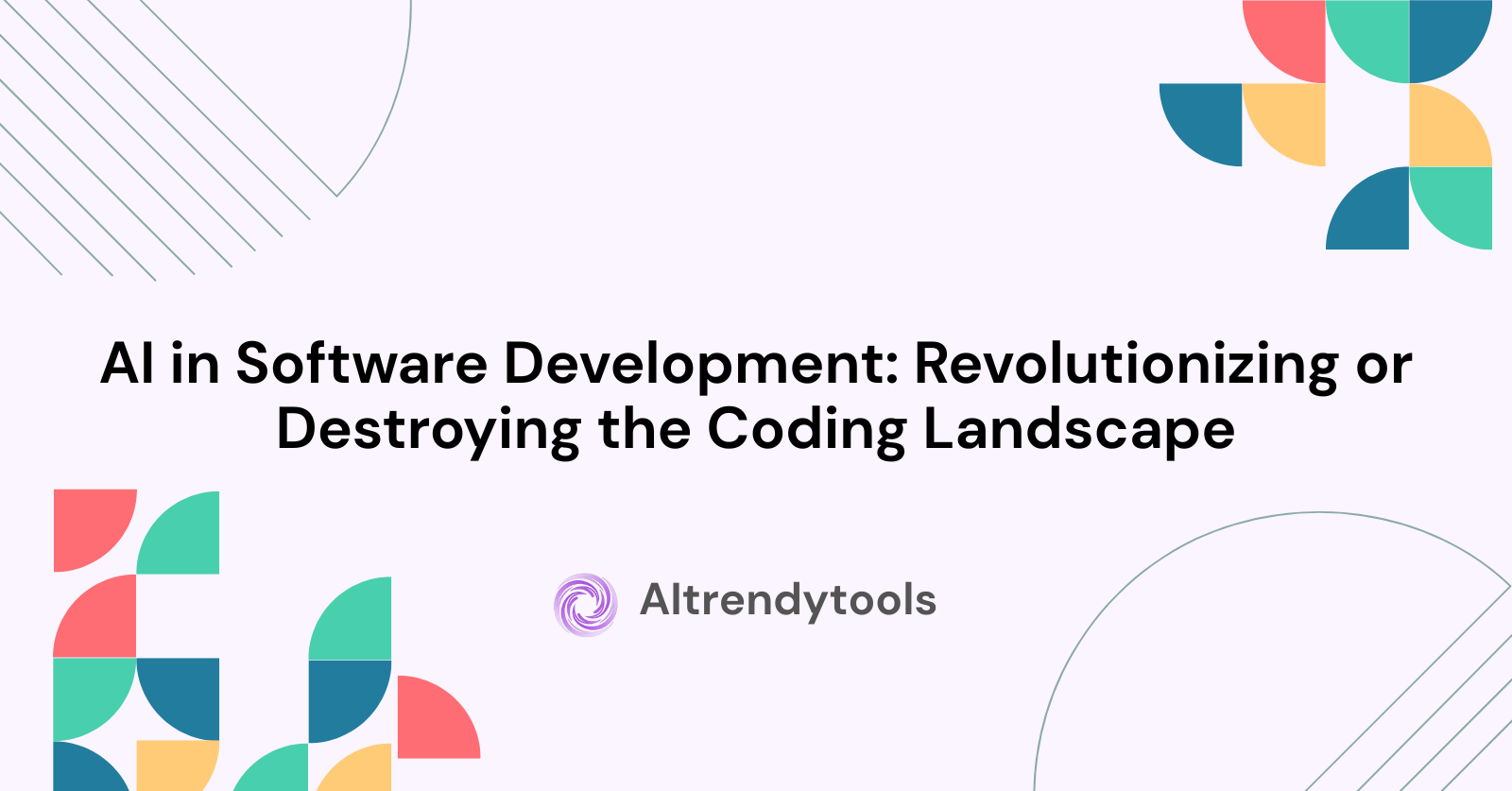🔥 AITrendytools: The Fastest-Growing AI Platform |
Write for usAI in Software Development: Revolutionizing or Destroying the Coding Landscape
Explore how AI reshapes software development with tools like GitHub Copilot. Learn its impact on efficiency, creativity, and the future of coding teams.
Feb 3, 2026
Sparks of innovation are flying in all directions, and at the center of this whirlwind stands Artificial Intelligence (AI). It’s reshaping the rules of software development, promising a revolution while also sparking concern: Will it replace developers? In this article, we’ll explore how AI is influencing the development landscape, especially in the context of a software development dedicated team, and what it means for businesses in 2025.
The Emergence of AI in Software Development
Artificial intelligence is no longer a buzzword; it's a tool that's penetrating all levels of the development process. By 2026, the majority of new business applications will be using AI capabilities. In the meantime, the market for AI solutions in software is developing incredibly fast: the generative AI category was worth about $16.9 billion in 2024 and may reach $109 billion by 2030.
AI tools like GitHub Copilot, Codeium, and Tabnine are becoming standard developer tools. These offerings use machine learning algorithms trained on billions of lines of code to offer autocomplete, code completion, and even bug fixing. For instance, JetBrains AI Assistant, which is integrated into IDEs and code editors, helps developers save time spent on trivial tasks; a majority save 1 to 5 hours per week, and some save 8 hours or more.
But there's more. AI doesn't just automate; it changes the development of software. A software development dedicated team can now focus on higher-level tasks such as architecture design or UX optimization instead of spending time on repetitive template coding. This shift aligns well with modern strategies in software development outsourcing, where external teams often take on routine or scalable components, allowing internal experts to focus on innovation. This is particularly true in the U.S., where competition in the IT sector calls for rapid time-to-market and high-quality products.
How AI Improves Development Processes
AI brings with it a wealth of advantages to software development, and the most important places where it's making its impact include:
Code Generation and Automation
GitHub Copilot is one such tool that generates code based on text inputs, significantly increasing developer productivity in tightly controlled settings, up to 55% faster. Savings in time in typical enterprise settings range from 30% to 50%, with nearly two-thirds of engineers experiencing a 25% or greater speedup.
Bug Detection and Quality Assurance
DeepCode AI products scan code using machine learning and can substantially reduce the number of bugs that make it to testing. It spots twice as many serious flaws as standard static analyzers with over 80% accuracy. Users mention the detection of as much as 95% of errors that are being overlooked in manual checks in some cases, though this statistic is for specific use cases.
Project Management Optimization
Artificial intelligence technology like specialized Jira plugins can forecast task completion timelines at about 80–90% accuracy. Such technology allows dedicated teams to better plan sprints and workload management, and anticipate potential delays. These benefits make a compelling case for why businesses should invest in custom AI solutions tailored to their specific development workflows.
The Human Element: Does AI Replace Developers?
Among the hottest questions: Will developers lose their jobs to AI? We are sure this is a myth, although it is not difficult to see why people are afraid. According to some sources, up to 70% of developers fear that AI will reduce employment opportunities, but others confess that it enhances their productivity. Actually, AI does not replace developers — it redefines their work. Instead of writing boilerplate code, professionals now dedicate their time to:
- Architecture design: Creating complex systems also requires human intelligence, which AI currently cannot match;
- Creative problem-solving: AI suggests options, but choosing the best one is a human responsibility;
- Collaboration and communication: A software development dedicated team functions as an organism in itself, where interaction skills matter, which AI cannot offer.
AI is increasingly becoming a partner, rather than a rival. For example, at Acropolium, where teams are composed of developers, designers, and managers, AI assists in automating routine tasks so that people can focus on innovation.
But reasonably enough, developers need to change all the same. We found three areas where new competencies are needed:
- Learning about AI tools: Being able to utilize GitHub Copilot or Tabnine is becoming necessary. More than half of the available job opportunities now demand AI tool experience;
- Prompt engineering: Knowing how to craft accurate AI prompts that get the correct code written is a newly sought skill;
- Emphasis on soft skills: Communication, project management, and collaboration are becoming increasingly important as AI handles technical tasks.
These shifts demand that developers be adaptable, but they also open up opportunities.
The Dark Side of AI in Development
Organizations are increasingly looking for experts who can judiciously integrate AI into their processes. But AI is no silver bullet; it has dark sides too:
● Dependence on AI: Excessive dependence on AI tools erodes coding abilities. Of developers who make use of AI, an increasingly large number write little or no code manually;
● Quality problems: AI-generated code can be inaccurate or substandard. As an example, one-fifth of GitHub Copilot's code still frequently requires adjustments;
● Ethical and security risks: The use of AI can lead to security breaches if the code holds confidential data.
To minimize such risks, we recommend verifying AI code periodically using tests and linters and deploying secure platforms like AWS CodeStar. This way, the use of AI is optimized and secure while still retaining process control.
Final Thoughts
Artificial intelligence does not supersede developers but causes them to be more efficient because they can focus on strategy and creativity instead of software development. Do you want to use AI to reshape your projects? Select the partner who offers experience, technology, and visionary strategy first. Having 18 years of experience and specializing in software development teams, Acropolium can take you to a new world. All you need is to book a consultation and find out how AI can propel your business.
https://unsplash.com/photos/woman-in-black-shirt-sitting-beside-black-flat-screen-computer-monitor-Im_cQ6hQo10
🚀 Submit Your Tool to Our Comprehensive AI Tools Directory
Get your AI tool featured on our complete directory at AITrendytools and reach thousands of potential users. Select the plan that best fits your needs.





Join 30,000+ Co-Founders
Related Blogs
8 Best AI Logo Generators in 2026
Discover the 8 best AI logo generators in 2026 after testing 30+ tools. See why Design.com ranks #1, followed by BrandCrowd, plus detailed reviews, comparisons, and results.
Design.com: Best AI Design Tool in 2026
Is Design.com the best AI design tool in 2026? We tested its AI logo generator, website builder, business cards, brand kit, and more—read our full in-depth review.
How AI May Change the Future of Online Casinos
Discover how AI is transforming online casinos with personalized gameplay, enhanced security, smarter marketing, and improved player protection.
Submit Your Tool to Our Comprehensive AI Tools Directory
List your AI tool on AItrendytools and reach a growing audience of AI users and founders. Boost visibility and showcase your innovation in a curated directory of 30,000+ AI apps.





Join 30,000+ Co-Founders

